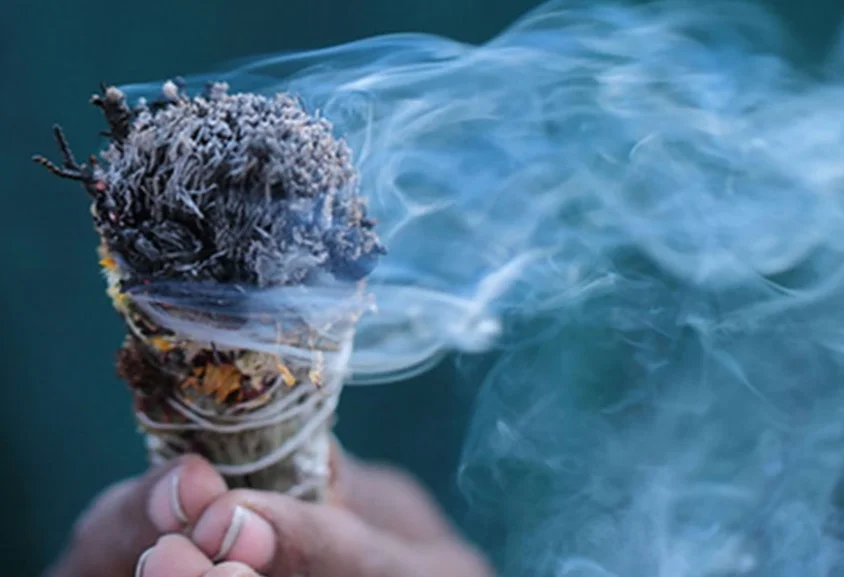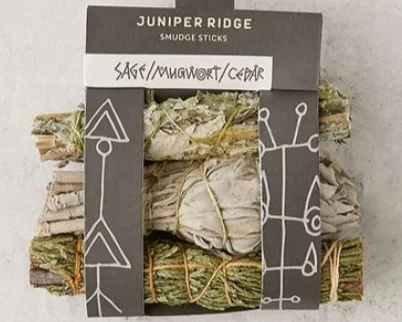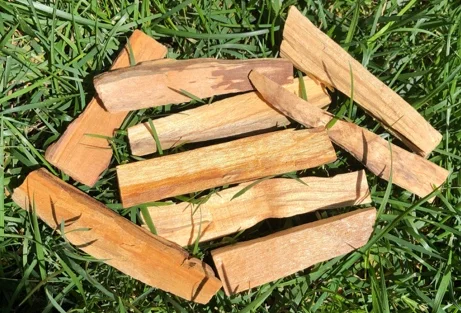Smudging is a pretty common thing these days, but I see a lot of confusion and controversy surrounding the practice. Overall, it seems pretty simple. You take a bundle of herbs and you burn them like incense, often to cleanse a space or person of negative energy. This practice has been used for hundreds of years by indigenous peoples all around the world.
Smudging is mostly known for its spiritual uses, but it actually has been scientifically proven to be beneficial to your health! Ions have a great effect on our wellbeing- studies by Dr. Clarance Hansell in the 1930s have shown that negative ions make us happier and positive ions make us less happy. Negative ions are produced more in natural settings, and they effect our serotonin levels, making us feel better. Smudging gives off lots of these negative ions, making it a great tool for fighting depression or SAD in the colder months. It can also help you sleep better (but remember to put it out before climbing in bed!)
The most commonly used plant for smudging is white sage. White sage, or sacred sage, is native to the Southwestern US and Northwestern Mexico, especially in Southern California on the deserts’ western edges. There is a great deal of controversy around this plant.
For one, the term “wild crafted” is not always a good thing. It sounds nice, but some companies clear cut it in the wild, killing off all the sage in the area. You need to make sure that if you buy wild harvested sage that sustainable practices are being used, which means they either grow their own, or when wild harvesting only cut 20% or less of the plants, only take it during the growing season, and respect the growing environment. Mountain Rose Herbs is a good source that follows these ideals.
Another more recent study found that smudging for 1 hour “caused over 94% reduction of bacterial counts” which lasted up to 24 hours in a closed room. So theres a good argument for daily smudging! You can throw that Lysol can right in the trash can.
Another topic of controversy about white sage is some believe that the mere use of it by non-indigenous peoples is cultural appropriation and even racist. Now, take into account that most of the people who feel this way are not indigenous or of native decent themselves, and I think that about does it for that argument.
However, I have read from indigenous viewpoints as well, and the settlers did steal their land and slaughter whole populations, take away their children and use violence against any who practiced their sacred rituals, used their sacred tools and medicine. They forced tribes to abandon their spiritual practices, their ancestral knowledge, their language and everything else that made them who they are. These crimes against the native people are still very much happening today as our government tries to steals what scraps they have left for pipelines and oil drilling.
So to see their sacred medicines and rituals taken and often bastardized into ridiculous novelty kits by big businesses like Urban Outfitters can be pretty painful. They are often used in ways that go against their ancestral teachings, and with little or no respect for the indigenous people they came from. But, on the other hand, if we don’t all share, and learn from each other, then we all remain boring and ignorant and especially separated.
We must remember to have respect for the people whose sacred tools we incorporate into our own lives, to value and seek their knowledge in their use. I am not indigenous, so I will not be teaching you HOW to perform sacred rituals or ceremonies. I only wish to talk about the issues surrounding it, because I too am learning.
If you prefer to not use sage in your smudging, lets talk alternatives! There are so many alternatives and the exist in every part of the world. My favorites are Palo Santo (shown here from my shop!), juniper and rosemary. You can also use birches, red cedars, pines, willows, apples, mesquite, sagebrush and sweetgrass. There are many types of plants than can be used the same as sage! You can choose based on your region, or the scents that you prefer or the plant that you connect with on your own level. Happy smudging!
Study: Medicinal smoke reduces airborne bacteria









